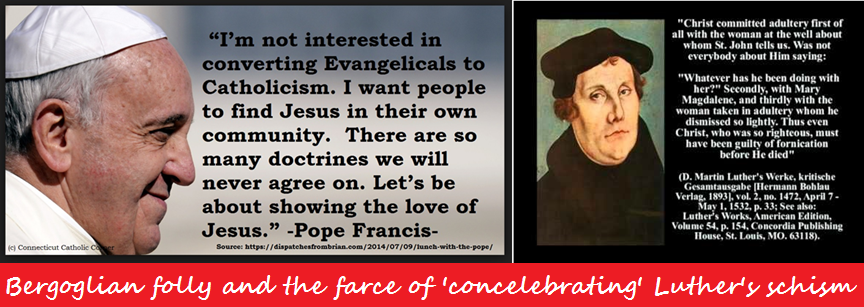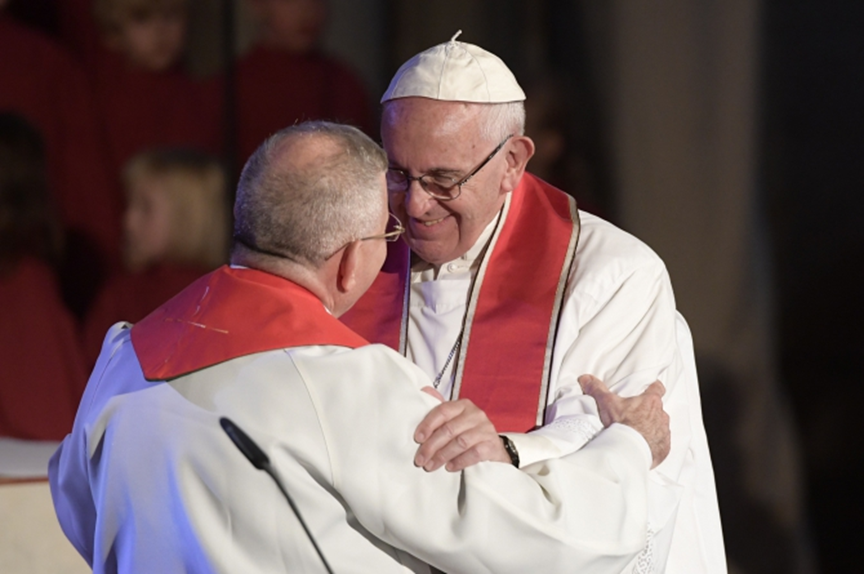
 Roberto De Mattei, to my great disappointment, does not quite express strongly enough the unprecedented and outrageously anti-Catholic nature
Roberto De Mattei, to my great disappointment, does not quite express strongly enough the unprecedented and outrageously anti-Catholic nature
of Bergoglio's apotheosis of Martin Luther.... I am still putting together a representative sampling of the available but sparse reactions
to the Lund event and to what was said there...
Kneeling before Luther
by Roberto de Mattei
Translated for Rorate caeli by Francesca Romana from

November 2nd 2016
It is with deep sorrow we say this.
What surfaced during the ecumenical meeting between Pope Francis and the World Lutheran Federation on October 31st in Lund, seems to be a new religion. A religion that has clear starting points, but murky, disquieting ends.
The slogan that resounded the most in Lund Cathedral was the need for a “common path” which would carry Catholics and Lutherans “from conflict to communion”. Both Pope Francis and Pastor Martin Junge, Secretary to the Lutheran Federation, made reference to the evangelical parable of the vine and branches in their sermons. Catholics and Lutherans would be the “dry branches” of a single tree which bears no fruit as a result of the 1517 separation.
However, nobody knows what this “fruit” would be. At the moment the only thing Catholics and Lutherans seem to have in common is a state of deep crisis, with different causes though.
Lutheranism has been one of the major factors in the secularisation of Western society and today it is in the death throes because of the consistency through which it developed the seeds of its own destruction, present at its very beginning.
The Scandinavian countries, long time considered models for our future, have been at the forefront of secularization. However, Sweden, after being transformed into the country of multiculturalism and homosexual rights, is today a country in which only 2% of Lutherans are practicing, while almost 10% of the population practice the Islamic religion.
By contrast, the Catholic Church is in a crisis of self-demolition, as a result of abandoning Her tradition in order to embrace the process of the secularization of the modern world, precisely as it was breaking up. The Lutherans are looking for a breath of life in ecumenism, and the Catholic Church is not alert to the breath of death in this embrace.
“What unites us is far greater than what divides us”, this was again repeated at the Lund ceremony.
Yet, what [precisely] unites Catholics and Lutherans? Nothing, not even Baptism, the only sacrament of the seven that Lutherans recognize.
For Catholics, in fact, Baptism removes original sin, whereas for Lutherans it cannot be cancelled, given that, for them human nature is radically corrupt and sin invincible.
Luther’s formula “sin strongly, but believe even more strongly” sums up his thought. Man is incapable of good and can do nothing other than sin and blindly abandon himself to Divine mercy. God decides who is damned and who is saved in an arbitrary, irrevocable manner. Freedom does not exist, only a rigorous predestination of the elect and the damned.
“By Faith alone” goes along with “by Scripture alone”. For Catholics there are two fonts of Divine Revelation: Holy Scripture and Tradition. The Lutherans eliminate Tradition since they claim that man must have a direct relationship with God, with no mediations.
It is the principle of the “free examination” of Scripture, from which springs individualism and contemporary relativism. This principle implies the denial of the Church and the Pope, whom Luther called “an apostle of Satan” and “antichrist”.
Most especially, Luther hated the Pope and the Catholic Mass, which he wanted to reduce to a mere commemoration, by denying its sacrificial nature and the Transubstantiation of the bread and wine into the Body and Blood of Jesus Christ.
However, for Catholics the renovation of the unbloody Sacrifice of Christ, which is in the Mass, is the only font of Divine grace. Is this simple misunderstanding and incomprehension?
Pope Bergoglio stated at Lund: “We too must look with love and honesty at our past, acknowledge error and ask forgiveness.” And again:
“it has to be acknowledged with the same honesty, that our division was deviating from the original intuition of the people of God, which aspires naturally to remain united, and [this] historically was perpetrated by worldly men of power more than by the will of the faithful.”
Who are these men of power? The Popes and Saints, who from the very beginning fought against Lutheranism? The Church, which for five centuries has condemned it?
The Council of Trent pronounced the decisive word on the incompatibility of the Catholic Faith with the Protestant one. We cannot follow Pope Francis along a different path.
November 7, 2016
P.S. Canon212.com. citing De Mattei's article in its above-the-fold headlines today, does so with the tagline, "Finally someone admits FrancisChurch is another religion", and I wish I could share the site's certainty that De Mattei was, in fact, saying that. At least, not as clearly as he could have if he really thought that. "Seems to be a new religion" is speculative rather than declarative.
Since this pope began his self-imposed rehabilitation of Martin Luther to the point of apotheosis and virtual canonization, and his parallel eulogies of the Reformation as having been 'medicine for the Church' when it was the greatest schism from the Church ever - greater than that of the Orthodox churches, with whom the Catholic Church retains so much more in common in terms of doctrine and liturgy than it has with any Protestant denomination except perhaps what was once known as High Anglican (who, I believe, have now mostly turned Catholic via the Ordinariates) - I began to call his 'faith', expressed in his idiosyncratic preachings and interpretations of the Gospel, and the matching heterodox pastoral practices he promotes, as Bergoglianism - in a direct analogy to Lutheranism, and to call him anti-Catholic plain and simple.
Forget all these circumlocutions like FrancisChurch or NuChurch or anything that avoids calling this sordidly mucked-up Bergoglian spade what it really is - Bergoglianism, which is now being practised by the church of Bergoglio, conveniently masquerading as the Roman Catholic Church because its founder happens to have been elected pope. An advantage Luther did not have, but look how far Lutheranism and Protestantism in general have gone.
But Bergoglio is pope and there is nothing we can do about how he chooses to exercise the awesomely considerable powers and authorities he is endowed with. Yet we do not have to accept that he is thereby 'changing' the Church to suit his narcissism and megalomania - whatever his motivations, he cannot really 'change' the Church.
We must bear in mind that any changes he makes, de facto or de jure, to the deposit of faith handed down to him on March 13, 2013, are not necessarily for ever, that they can be changed by the next pope who is a genuine Catholic. Even if, alas, the insidious, pernicious and noxious consequences of all the mini-me bishops and cardinals he has named will take a long time to reverse.
An Italian journalist and essay writer (born 1955), who has been called one of the most representative of contemporary Italian intellectuals on the right, had the following reflection after our beloved pope's Lutheran pilgrimage-homage to Lund...

Pope Francis and the Lutherans:
More papal publicity
by Marcello Veneziani
Translated from

November 1, 2016
How are we to define Pope Francis from a theological and pastoral, human and behavioral, point of view? We could say ‘an extrovert pope’.
But not in the current understanding of the term, namely, as a communicative, sociable person, rather in a meaning closely bound to how he is carrying out his mission as pope.
Jorge Bergoglio is a pope who is totally projected outwards – he addresses himself less to Catholics and more to Protestants and Muslims (of whom he has brought in refugee families to the Vatican).
He is more concerned with the unlimited acceptance of immigrants than with the new poverty among our own people, he dialogs more with atheists and non-Christians than with theologians [for whom, other than his personal theologians Fernandez, Kasper and Schoenborn, he has little respect or use, and thinks they should all be sent to a desert island], and he reads secular newspapers like La Repubblica rather than his own L’Osservatore Romano.
Some will say that it is an evangelical mission to be more concerned about the lost sheep than the flock itself and to take care of those ‘brothers’ who are far away rather than those who are close at hand. That a pope should not close himself behind the bronze doors of a church in crisis but go out into the open and talk to the world. [As if John Paul II and Benedict XI had closed themselves in and never spoke to the world – when everything they said and did in behalf of the Church and the People of God was their message to the world.] So say his defenders.
But here we have problems? Is a Pope ‘for external use only’ able to bring back to the faith, to Christianity, to the Church, those who are most estranged and refractory? Judging from the data, from perceptions as well as from facts, his effect has been the exact opposite.
This pope is distancing himself from the faithful without attracting atheists, agnostics, or non-Christians to the faith. He demotivates the faithful without motivating those he ought to attract.
Then what will remain of his pontificate, of his continuous dialog with Protestants, Muslims, atheists and skeptics? His media-driven popularity, devoid of any religious sense. And then nothing.
It doesn’t look at all that the passage from an ‘introvert’ and cultured pope, bound to Christian doctrine and tradition as Papa Ratzinger was, to an extrovert pope with a gift for histrionics, has changed, reined in, or reversed the trend of de-Christianization. On the contrary.
And so, we have the impression that an extrovert pope is allowing more sheep to leave his flock without bringing back anyone. To use the words of Longanesi [Leo Longanesi, 1905-1957, Italian journalist, editor, painter and aphorist, considered a maître a penser in his time, whose centenary the Italian ministry of culture marked in 2005 with a commemorative stamp], this is a pope who might well end not in the odor of sanctity but in the stench of publicity.
[Modificato da TERESA BENEDETTA 07/11/2016 23:40]